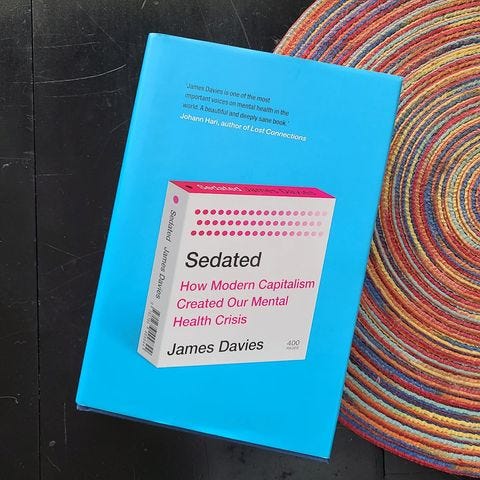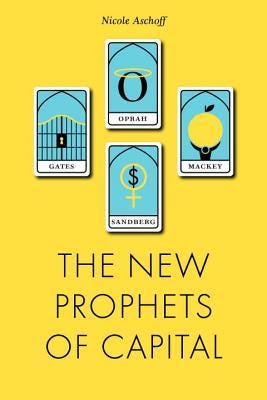Greetings D-landers!
We touched on a lot of themes in the last episode that both of us have written about elsewhere, so I thought I’d compile some of that here for you to explore. I’ve also clipped some quotes from our research and suggested some readings, if you want to get a lil nerdy about neoliberal thought.
The Superpower Narrative’s Champion
In E05, we talked about the origins of the ADHD superpower narrative, much of which I think we can attribute to popular psychiatrist Ed Hallowell. Here’s a post I wrote recently exploring something he’s said several times, that the reason European settlers colonized America was because they were “full of ADHD genes”. 😬
Here’s another essay I wrote on Hallowell’s superpower narrative and how social media marketers are selling ADHD to us as a medicalized version of the American Dream.
The Dark Side of Positivity
We talked about how positivity is used as a sneaky form of control — self-help is all about learning how to self-manage and self-regulate. Here’s Ayesha in a recent post on her newsletter:
We’ve gone from just being workers to eternal entrepreneurs building our own exploitative enterprise. Our isolation, loneliness & solitude makes us self-combative- we voluntarily & happily self-destruct under the guise of personal ambition. If we fail according to arbitrary metrics of success in this society, we feel intense shame instead of questioning the society itself & the systems we operate in.
Manifesting Profit
Toward the end of the episode, we discuss an influencer who tells her followers to “manifest with Netflix” — watch shows about rich people, emulate them, and imagine that you are rich, too. These ideas are everywhere on social media right now, and I dug a bit into their history here:
Competition, Competition, Competition
Being an ADHD Boss is all about being better than other people. Having a brain that’s “faster than normal” a la Peter Shankman, or a “Ferrari with bicycle brakes”, as Hallowell always says. The superpower narrative sells superiority.
Here’s an IG post on that by Ayesha:
Neoliberalism and the Commodification of Mental Health
I read a short quote from this paper by Luigi Esposito and Fernando M. Perez in the beginning of the episode, but here’s the whole thing, plus a bit more [emphasis mine]:
Although often linked to promarket policies such as deregulation, privatization, and liberalization, neoliberalism is far more than simply a set of policy prescriptions. Neoliberalism supports a type of order and vision of the world in which all aspects of social, cultural, and economic life are shaped by what is sometime referred to as ‘‘market rationality’’—that is, evaluating the merit of all actions according to what is deemed as valuable, acceptable, or desirable by ‘‘the market’’ (Brown 2006; Currie 2006; Esposito 2011; Giroux 2008). The market, in this sense, is widely regarded, either explicitly or implicitly, as an autonomous and self-regulated entity that defines reality and hence requires no basis for legitimacy outside its own logic (Esposito 2011; Giroux 2008). Accordingly, encouraging people to adjust their attitudes, habits, and behaviors to fit market demands is typically associated with functional/rational behavior. Not accepting or failing to become fully integrated into this market reality is, at best, regarded as a type of irrational/unproductive idealism, or, even more typically, associated with personal deviance and/or pathology.
They go on to discuss how this becomes a business:
In effect, because success, virtue, and happiness in a market society are often associated with material wealth, prestige, and ‘‘coming out on top,’’ it follows that normalcy itself is typically conceived along these reified objectives (e.g., Pe ́rez and Esposito 2009). Acquiring services and/or products that might aid people to meet these results is thus viewed as benevolent and perhaps even indispensable in the pursuit of a fulfilling and productive life. What this also suggests is that integration, mental health, and human well-being become largely functions of consumerism (i.e., these goals require that people conform to the neoliberal notion that their primary role is that of a consumer). As a result, this neoliberal image of reality legitimizes notions of normalcy and/or sanity as commodities to be bought, sold, and profited from.
For History: Sedated by James Davies
While we don’t agree with everything Davies writes (the conclusion of this book is pretty reformist), he does compile a solid history of how neoliberal policies in the UK shaped mental healthcare in his book Sedated. He looks at how CBT is used to brainwash people who receive unemployment benefits into thinking they just can’t get a job because they don’t think positively enough, the way managerialism has led to schools being run more like businesses, and how consumer debt was used as an “economic band-aid” that ended up shaping our sense of self and personal politics.
Click through that IG post by @mad.subjectivity to read some clips (and give them a follow, their reading recommendations are great).
For Rhetoric: The New Prophets of Capital by Nicole Aschoff
This is maybe my favorite book that breaks down neoliberal rhetoric — it’s easy to read and each chapter is on a different wealthy person and the things they preach. The Oprah chapter is probably most relevant to E05, as it discusses New Thought and bootstrap positivity. There’s also a chapter on Sheryl Sandberg’s girlbossing, John Mackey’s “conscious capitalism”, and Bill Gates’ philanthropic capitalism.
Do you have thoughts, questions, or suggestions? Maybe a resource to share? Drop it in the comments! You can also email us at disorderland@gmail.com.








